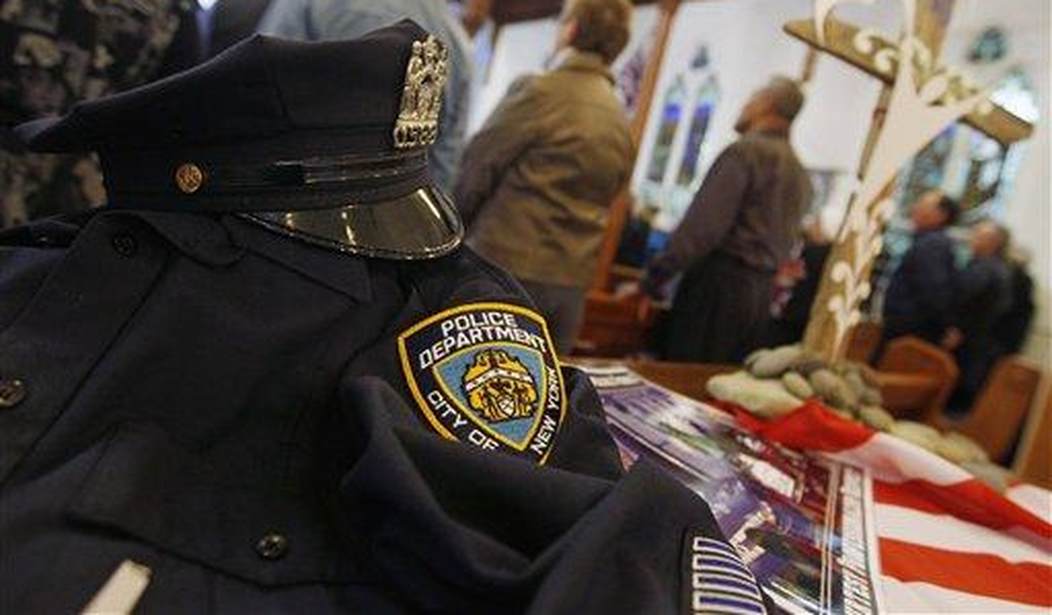Saturday, the New York Post took a close look at the pace of retirements and departures from the ranks of the New York Police Department, less than a year after the move to “Defund the Police” found traction in the aftermath of the death of George Floyd.
More than 5,300 NYPD uniformed officers retired or put in their papers to leave in 2020 — a 75 percent spike from the year before, department data show.
The exodus — amid the pandemic, anti-cop hostility, riots and a skyrocketing number of NYC shootings — saw 2,600 officers say goodbye to the job and another 2,746 file for retirement, a combined 5,346.
In 2019, the NYPD had 1,509 uniformed officers leave and 1,544 file for retirement, for a total of 3,053.
The Post article notes that hiring by NYPD has not kept pace with the rate of departure, and the current ranks of the NYPD total just under 35,000 officers, down from 36,900 — the number of officers employed at the end of 2019.
Through April 21 of this year, 831 cops have retired or filed to leave — and many more are expected to follow suit in the current anti-cop climate, according to Joseph Giacalone, a retired NYPD sergeant and adjunct professor at John Jay College of Criminal Justice.
“Cops are forming a conga line down at the pension section and I don’t blame them,” Giacalone said. “NYPD cops are looking for better jobs with other departments or even embarking on new careers.”
The pace is expected to quicken in the aftermath of the conviction of former Minneapolis Police Officer Derek Chauvin, the increased calls for more prosecutions of police officers stemming from “use of force” incidents, and a vote by the New York City Council to end “qualified immunity” for NYPD Officers from civil claims. That means officers will now be potentially exposed to personal liability lawsuits filed by individuals who claim officers violated their rights in any police encounter.
Giacalone expects a “long, hot summer ahead,” — with the City Council vote to remove qualified immunity from the NYPD — making it far easier to personally sue a cop and turning “the job [into] … a minefield.”
Police Benevolent Association President Pat Lynch told The Post, “The Mayor and City Council are absolutely trying to abolish the police. They’ve kept our pay absurdly low. They’ve ratcheted up our exposure to lawsuits. They’ve demonized us at every opportunity. And they’ve taken away the tools we need to do the job we all signed up for, which is to keep our communities safe.
“Now the NYPD is spending money on slick recruiting ads to replace the experienced cops who are leaving in droves. City Hall should just admit the truth: police abolition-through-attrition is their goal. They won’t stop until the job has become completely unbearable, and they’re getting closer to that goal with every passing day.”
This new reality is being seen in big cities across the country, with the rank and file of the police departments believing they have been abandoned by the political establishment in favor of Antifa, BLM, and other liberal interest groups.
What is being “gained” by the communities that have been served by these departing officers, and for whom there will be fewer replacements? It seems that the “Defund the Police” movement is the primary beneficiary of this rapid downsizing.
But at what cost? Reducing the size of the police force will reduce the number of interactions between the police and the citizenry — but not necessarily between the criminals and the citizenry.
According to a story from Forbes back in February,
A new survey of crime data in 34 of America’s biggest cities found a 30% increase in homicides in 2020, a jump researchers describe as having “no modern precedent” and link tentatively to the coronavirus pandemic and racial justice protests that started over the summer.
While homicide rates calculated from this survey topped 2019’s numbers in every month of the year, the biggest increase came after the May protests, with homicides rising 37% compared to 2019 in June through August (the study notes that this increase is statistically significant even taking into consideration a typical increase in homicides over the summer months).
My time and experience as a participant in the mechanism of the criminal justice system left me with one lasting impression that is not something well enough understood by the citizenry at large.
A function of the freedoms we all enjoy as citizens of this great country is that, for the most part, the police in the United States are not empowered to arrest people in order to prevent crimes. Most exercises of police power in the United States come in the aftermath of crimes that have already been committed, and the arrest is the action that begins the process for establishing guilt and accountability for the illegal acts in the criminal justice system.
One aspect of this freedom is that it incorporates a “risk-reward” calculation in criminal activity — “Is the reward from the criminal conduct such that it is worth the risk that I might get caught and go to jail?”
There is an entire segment of the population of the United States that lives according to this calculation because for them crime is easier than work. It takes less time and is usually more financially rewarding for those who don’t want to learn skills valuable to employers. It leaves much more free time every day of every week to do what they want to do rather than what their employer requires them to do in order to earn a paycheck.
When the risk of apprehension goes down, the risk-benefit calculation weighs even more heavily in favor of criminal behavior as compared to finding a job.
“Defunding the Police” makes the “work” of those who choose crime over employment even easier and less risky.
The victims in this shifting dynamic will be the residents of the big city neighborhoods that these departing officers leave behind.














Join the conversation as a VIP Member